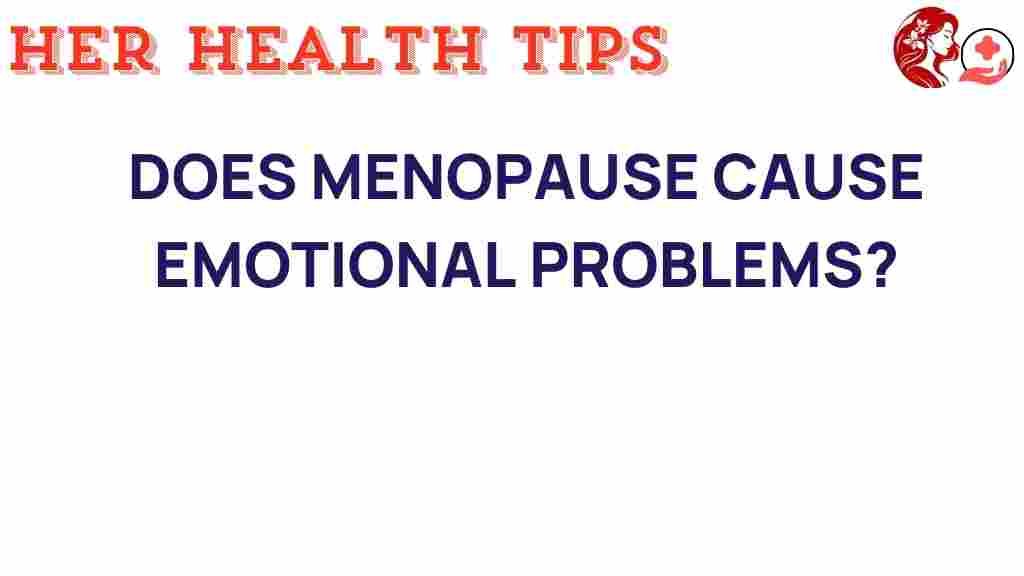Unraveling the Emotional Turmoil: Does Menopause Affect Mental Health?
Menopause is a natural biological process that marks the end of a woman’s reproductive years, typically occurring between the ages of 45 and 55. While the physical symptoms of menopause, such as hot flashes and night sweats, are widely discussed, the emotional health implications often remain overlooked. This article delves deep into how menopause affects mental well-being, exploring the hormonal changes that occur during this phase, their psychological impact, and effective support strategies for women navigating this significant life transition.
Understanding Menopause and Its Hormonal Changes
During menopause, a woman’s body undergoes significant hormonal changes. The primary hormones involved are estrogen and progesterone, which decrease in production. These hormonal shifts can lead to various physical and emotional symptoms, including:
- Hot flashes
- Night sweats
- Sleep disturbances
- Mood swings
- Memory problems
As estrogen levels decline, many women report experiencing increased irritability, anxiety, and depression. Understanding these changes is crucial for addressing the psychological impact of menopause on women’s health.
The Connection Between Menopause and Mental Health
Research indicates a strong correlation between menopause and mental health issues. The transition can trigger or exacerbate pre-existing conditions, leading to:
- Increased anxiety
- Depression
- Emotional instability
- Difficulty concentrating
These challenges not only affect a woman’s daily life but can also impact her relationships and overall quality of life. Understanding this connection is essential for both women experiencing menopause and healthcare providers.
Mood Swings and Emotional Turmoil
Mood swings are one of the most common symptoms experienced by women during menopause. Fluctuating hormone levels can lead to feelings of sadness, irritability, or anger. This emotional turmoil can be bewildering and may cause feelings of isolation or confusion.
Strategies for managing mood swings include:
- Regular physical activity
- Mindfulness and meditation practices
- Maintaining a balanced diet rich in nutrients
- Seeking therapy or counseling
By employing these strategies, women can enhance their emotional health and better manage the psychological challenges that accompany menopause.
The Psychological Impact of Aging
Aging itself can bring about anxiety regarding physical appearance, health, and life changes. The onset of menopause can compound these feelings, leading to an overall sense of loss or diminished self-worth. It is important to recognize that these feelings are valid and common among women undergoing this transition.
Support Strategies for Mental Well-Being
Addressing mental well-being during menopause requires a multi-faceted approach. Here are some effective support strategies:
- Open Communication: Encourage discussions about menopause and related challenges with friends, family, and healthcare professionals.
- Join Support Groups: Connecting with other women who are experiencing similar challenges can provide emotional support and practical advice.
- Professional Help: Consult a mental health professional if feelings of anxiety or depression become overwhelming.
- Healthy Lifestyle Choices: Engage in regular exercise, eat a balanced diet, and prioritize sleep to improve overall emotional health.
For additional resources, consider visiting this external link that provides comprehensive information on menopause and emotional health.
Step-by-Step Process for Managing Menopause Symptoms
To effectively manage the emotional and psychological impacts of menopause, women can follow this step-by-step process:
- Track Symptoms: Maintain a journal to record mood changes, physical symptoms, and triggers.
- Educate Yourself: Learn about menopause and its effects on emotional health through books, reputable websites, or healthcare providers.
- Implement Healthy Habits: Incorporate regular exercise, a nutritious diet, and adequate sleep into your daily routine.
- Practice Stress-Reduction Techniques: Explore techniques such as yoga, meditation, or deep-breathing exercises to manage stress.
- Seek Support: Reach out to friends, family, or support groups to discuss experiences and feelings.
- Consult Professionals: If necessary, seek the help of healthcare providers for medical or therapeutic support.
By following these steps, women can take proactive measures to safeguard their emotional health during menopause.
Troubleshooting Common Emotional Challenges
Some common emotional challenges during menopause include:
- Persistent Sadness: If feelings of sadness persist, consider speaking with a therapist or counselor.
- Overwhelming Anxiety: Engage in relaxation techniques and consult a healthcare provider if anxiety becomes unmanageable.
- Difficulty with Relationships: Open communication with partners and close friends can help navigate changes in relationships.
Implementing these troubleshooting tips can lead to improved emotional health and well-being.
Conclusion
Menopause is a significant life transition that can profoundly impact a woman’s emotional health and mental well-being. The hormonal changes during this period can lead to mood swings, anxiety, and depression, affecting daily life and relationships. However, by understanding these challenges and employing effective support strategies, women can navigate menopause with greater ease and maintain their mental health. It is essential to prioritize open communication, seek professional help when needed, and embrace a healthy lifestyle to foster emotional resilience.
For more information on managing menopause and its effects on women’s health, check out our detailed guide here.
This article is in the category Reproductive and created by HerHealthTips Team
